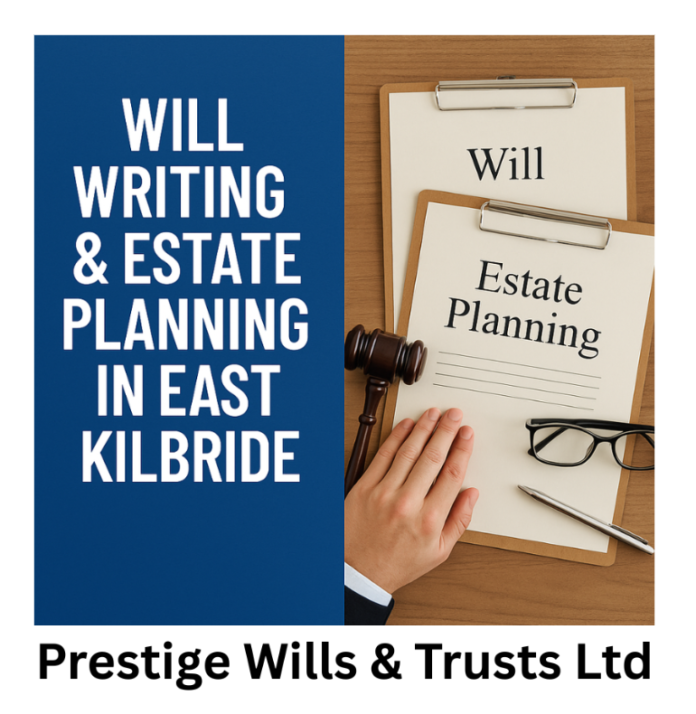Planning for the future is one of the most responsible things you can do—especially if you own property, have children, or care about who inherits your estate. In East Kilbride, more families are turning to will writing and estate planning to ensure their wishes are respected and their loved ones protected.
Whether you’re just starting to think about your legacy or need to update an existing will, this guide covers the essentials of estate planning in Scotland—and why it matters.
At Prestige Wills & Trusts Ltd, we know that protecting your family’s future and preserving your legacy is essential. As trusted estate planning specialists in East Kilbride, Glasgow, and across the UK, we offer expert, personalised guidance on wills, trusts, and inheritance matters—helping you plan with confidence and clarity.
Why a Will Matters
A will is a legal document that sets out what should happen to your estate when you die. Without one, your estate is distributed according to Scottish intestacy laws, which might not align with your personal wishes.
For example, without a will:
- Unmarried partners may receive nothing.
- Your estate might be tied up in probate for months.
- You can’t choose guardians for your children.
- Inheritance tax planning opportunities may be missed.
A valid will allows you to:
- Name beneficiaries and executors.
- Appoint guardians for children under 16.
- Leave specific gifts or donations.
- Avoid disputes among family members.
In East Kilbride, many residents don’t realise how easy it is to make a will—or how risky it is to delay.
What Is Estate Planning?
Estate planning is broader than writing a will. It involves making legal arrangements for your assets, health, care, and tax affairs. Good estate planning ensures:
- Your family is financially secure.
- You remain in control even if you lose capacity.
- Your estate passes efficiently, avoiding unnecessary tax and delays.
Core elements of estate planning include:
1. Wills
As explained, your will dictates who inherits your estate. It’s the foundation of your estate plan.
2. Power of Attorney (PoA)
This legal document lets someone you trust make decisions if you’re unable to. There are two types in Scotland:
- Continuing PoA (for financial matters)
- Welfare PoA (for health/care decisions)
PoAs are crucial, especially for ageing parents or individuals with health concerns.
3. Trusts
Trusts can help protect assets from care fees, tax, or irresponsible beneficiaries. They’re useful for:
- Young children
- Vulnerable adults
- Second marriages or blended families
4. Inheritance Tax Planning
The current threshold for Inheritance Tax in the UK is £325,000. Anything above this may be taxed at 40%. Estate planning can reduce or eliminate this liability through lifetime gifts, trusts, and other exemptions.
5. Funeral Planning
Pre-arranging your funeral reduces emotional and financial strain on your loved ones. You can state your preferences in your will or set up a separate funeral plan.
When Should You Start?
The best time to start estate planning is now. Many people in East Kilbride put it off until retirement or illness, but the earlier you plan, the more flexibility and protection you have.
Consider creating or updating your will if:
- You’ve bought a property
- You’ve recently married, divorced, or had children
- You’ve started a business
- A loved one has passed away
- You’ve moved to or within Scotland
Common Mistakes to Avoid
Even with the best intentions, many people make critical errors when it comes to their estate:
- DIY wills that don’t follow legal formalities
- Outdated wills after life changes
- Not naming guardians for young children
- No PoA in place, causing court delays if capacity is lost
- Poor tax planning, costing families thousands
These mistakes are easily avoided with the right advice and regular reviews.
What Happens If You Die Without a Will in Scotland?
If you die intestate (without a will), your estate is distributed under Scottish succession laws. Here’s a brief overview:
- Prior rights: Your spouse/civil partner gets certain rights to your home, furniture, and cash.
- Legal rights: Children can claim a share of your movable estate.
- Remaining estate: Any leftover is divided among surviving relatives in a set order.
This process can be time-consuming, and loved ones may have to go through the courts to access your estate. Writing a will ensures you remain in control of who gets what.
Final Thoughts
Will writing and estate planning aren’t just for the wealthy or elderly. They’re for anyone who wants peace of mind, clarity, and control. Whether you’re protecting your children, planning for care, or passing on your home, having a legally valid plan in place can make all the difference.
In East Kilbride, more families are recognising the importance of putting their affairs in order—before it’s too late.
Take the First Step Today
At Prestige Wills & Trusts Ltd, we make will writing and estate planning simple, personal, and stress-free. Whether you’re planning for the future of your children, your home, or your own care needs, we’re here to help you get it right—locally, professionally, and affordably.
Visit us at: 103, Strathmore House, East Kilbride, Glasgow G74 1LF
Call: +44 1355 209333
Website: Prestige Wills & Trusts Ltd
✉️ Email: info@prestigewillsandtrusts.co.uk
Let us help you secure what matters most—with confidence and clarity.

